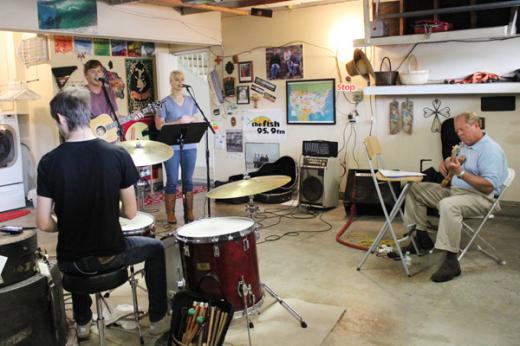- Home
- Products
- Sound Tech and PA
- Sound Tech DVDs & Downloads
- Free Tech Resources
- Free Sound Tech Lessons
- Playing By Ear
- Play By Ear DVDs & Downloads
- Ear Training & Music Theory Resources
- Worship Leading
- Worship Leading Course Downloads
- Free Worship Leader Training
- Free Worship Leader Resources
- Worship Band Skills
- Band Skills DVDs & Downloads
- DIY Worship Team Workshops
- Free Worship Team Training
- Free Worship Team Resources
- Never make changes to songs. Once you’ve played a song a certain way, always play it that way, no matter what. There’s less chance of messing up.
- Play only four chord songs. There’s quite a few to choose from.
- Play only two songs per week. If the pastor wants a closer, tell him to go pound sand.
- Quote Bible verses to your team about preparing and serving and sacrifice, and frequently mention the widow who gave her last mite.
- Hire professional musicians. Your budget can handle it.
- Use backing tracks instead of a band. Those players are always spot on, they won’t show up late, and the drummer is never too loud.
- One ministry I’m acquainted with was able to eliminate the re-rehearsing issue altogether: they simply dropped their mid-week rehearsal and just practiced Sunday morning. [Yeah, that didn’t work so hot.]
The difference between practice and rehearsal – new guest series
Do you find your worship team re-rehearsing almost every song on Sunday morning? It’s like the mid-week rehearsal didn’t occur. Or at best, it’s three steps forward and two back. Transitions have been forgotten. Dynamic changes are sucked into some black hole in the collective band brain. And that major change in the chart we rehearsed several times has now caused a pre-service train wreck.
Let me give you some possible solutions to this:
So none of these possibilities are grabbing you? Me neither. So how can we retain what happens at rehearsal until Sunday’s warm-up/sound check?
I think it starts with teaching our teams (and ourselves) the difference between practice and rehearsal. These two terms are often used interchangeably. I’ve started to make a clear distinction for the sake of communicating a preferred future: Practice is personal. Rehearsal is relational.
Ever have a team member that you wanted to ask, “Has your instrument been out of its case since the last Sunday?”
I do.
But then that still, small elbow jabs me in the ribs and reminds me how often my guitar sits dormant between Sundays. Rather than guilt my team members (or myself), I’m slowly retraining us to look differently at practice.
Practice is personal preparation for the rehearsal. When the song is learned by individuals in practice, the rehearsal then becomes about the team working together to shape each song and each segue into a worship experience for their fellow believers.
Practice is personal. Rehearsal is relational.
Let’s say I fail to prepare on my own for a new song. That puts me in survival mode during rehearsal. I’m thinking of chord changes on the guitar and getting the melody right as the lead vocalist. I’m scanning ahead in the chart to anticipate the repeats. My focus is on me.
The team follows my lead: their heads are buried in their stands. They aren’t listening to each other. They aren’t concerned with dynamics. They’re fright-reading. Just like me.
When we neglect the work of personal preparation, the mid-week team gathering becomes the “learning event.” As a result, the Sunday morning warm-up/sound-check is an exercise in reminding each other of turnarounds, tags, dynamics, who lays out where, etc. What should have been a “run-through” becomes a “redo” of Thursday night.
We need to put a new vision before our team: Practice is personal. Rehearsal is relational.
In the next part, we’ll look at practical stuff to motivate us to practice our stuff.
Guest post by Jon Nicol – a worship pastor, guitarist, songwriter and all-around-lover of helping people use their gifts and abilities to worship Jesus. This series first appeared at WorshipMinistry.com and Jon’s site worshipteamcoach.com. Thanks for permission to reproduce.
Other posts you might like:
Rehearsing tips for worship musicians – video clip
Ideas to improve band communication – video clip
How to maintain a flow of worship
Tips for working with a band – video clip
Empowering young people into worship – part 1
Empowering young people into worship – part 2
Empowering young people into worship – part 3
Creating space in a worship arrangement


 Free Band Skills course with all Musicademy or Worship Backing Band DVD orders
Free Band Skills course with all Musicademy or Worship Backing Band DVD orders  Free gift with all Musicademy and Worship Backing Band DVD orders
Free gift with all Musicademy and Worship Backing Band DVD orders  Worship Training Day Ealing London 5 November 2022
Worship Training Day Ealing London 5 November 2022  How to get maximum exposure for your song writing
How to get maximum exposure for your song writing  Streaming online church services: the tech, the tips and the stories from around the world
Streaming online church services: the tech, the tips and the stories from around the world  What do you most struggle with as a worship musician?
What do you most struggle with as a worship musician?  Worship Leader Training: Beginning and Ending Songs Well
Worship Leader Training: Beginning and Ending Songs Well  Learn how to play by ear
Learn how to play by ear  4 tips for making good use of your mic
4 tips for making good use of your mic 

